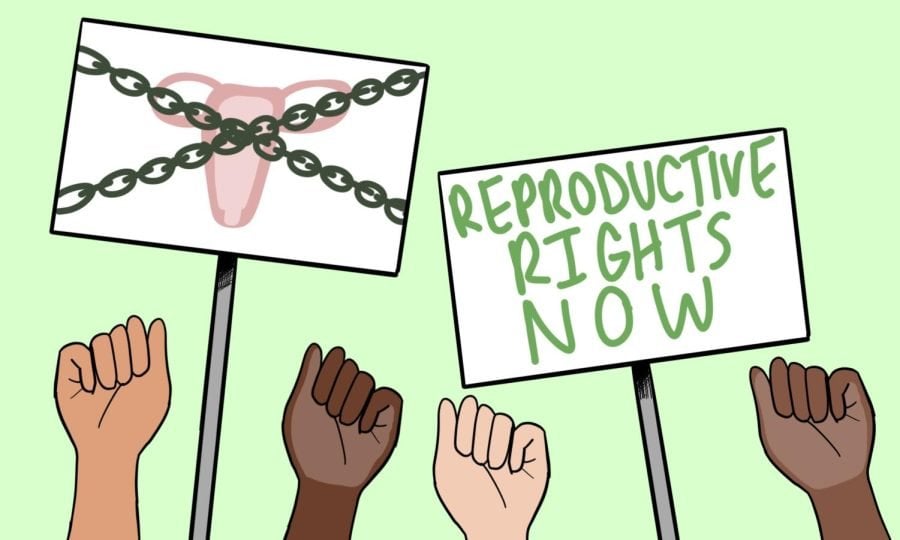NU students discuss past and future work in abortion rights post-Roe
Daily file illustration by Olivia Abeyta
Northwestern students have been working in the abortion rights field since long before Roe v. Wade was overturned.
August 2, 2022
When Weinberg junior Vivica Lewis first learned the Supreme Court overturned Roe v. Wade, she said she stayed off social media and avoided talking to people about the news because “it just hurt so bad.”
Lewis has spent the summer working on a research project about the history of birth control access in countries across the globe. By the end of August, she will have traveled to Buenos Aires, London, Dublin, Paris and Singapore. But Lewis, who has worked in sexual health education and reproductive justice for several years, said she knows it will immediately be “all hands on deck” for her and other activists once she returns to the U.S.
“As someone who works in the field, it’s harder because you see firsthand what it is like and you know who will be hurt the most,” Lewis said.
During her first two years at Northwestern, Lewis taught Chicago high school students about health through the Peer Health Exchange student organization. More recently, she worked with Illinois Contraceptive Access Now and performed data entry for a Chicago-area abortion clinic, and she is currently a sexual health education intern for Chicago Public Schools.
While Lewis said she’s still figuring out next steps, her goals include continuing to donate to mutual aid groups, expanding sexual health and abortion education in CPS and training to be an abortion doula at the Chicago Women’s Health Center.
“No one sets out to get an abortion, and so it is a very hard, emotional process,” Lewis said. “Aabortion doulas are very helpful in easing that pain as much as they possibly can. ”
Medill junior Lunden Mason, executive director of Sexual Health and Assault Peer Educators, said her group will continue to provide abortion resources and spread awareness among the student body in the wake of the Supreme Court decision. SHAPE also partners with the Center for Awareness, Response and Education, which she said is now offering expanded help for students to find and travel to abortion providers.
Mason is also exploring further actions SHAPE can take for abortion access. She said she recently applied for a collaboration with Plan C, a campaign to make abortion pills more accessible via mail, and has also discussed an initiative to facilitate transportation and lodging for students in nearby states that have to travel to Illinois for an abortion.
“I personally, and I know many other people in SHAPE feel the same way, would do whatever we can, funding or support services or otherwise, to help someone through the process of having an abortion,” Mason said. “As SHAPE members, we just definitely want to be in community with everyone right now, because I know it’s a really difficult time.”
SHAPE has also provided financial support to the abortion rights cause, Mason said. She cited its Sex Toy Fair in Spring Quarter, which she said raised more than $1,000 for the abortion fund Indigenous Women Rising. Mason added that she also donates to the Yellowhammer Fund, an abortion fund primarily serving the South, and encourages people to support smaller abortion funds that don’t have the means of groups like Planned Parenthood.
Students at other reproductive justice-oriented groups are also thinking about actions they can take to support abortion rights. Weinberg junior Irene Quan and Weinberg sophomore Rhea Sharma, the co-presidents of NU Menstrual Equity Activists, said they have discussed initiatives like volunteering at abortion clinics.
“We’re centered on menstrual equity, which at its core means that we want to help alleviate any discrepancies that menstruators face,” Sharma said. “Abortion obviously also fits into that realm of reproductive rights.”
Sharma said the club welcomes anyone interested in empowering people who menstruate or can get pregnant. She added that she’s seen lots of new members create their own passion projects and receive support from the rest of the group.
Menstrual products and abortions have similar issues with access, Quan said. She said both methods of care should be as accessible as toilet paper.
“With both abortion rights and reproductive rights, it’s something that affects everyone, whether you’re talking about people at Northwestern or all the way across the world,” Quan said. “And still, it’s something that can be so taboo in different communities and cultures.”
Quan said she expects the group’s potential abortion rights advocacy to be even more crucial because Illinois is surrounded by states with substantial abortion restrictions or bans.
Mason said NU could also do more to support abortion rights. Although it has limits to what actions it can take as a university, she said she believes institutions in general should advocate more for the cause and divest from anti-abortion corporations and politicians.
“They can have a huge impact,” Mason said. “It would be really, really encouraging to see the institution put some money behind these causes that their students really, really care about.”
Lewis said her passion for her work partially derives from her experience as a Latina and Black woman. Her communities, she said, have long suffered reproductive injustice, to the point that many were unsurprised by the overturning of Roe.
Nevertheless, Lewis said she remains optimistic that abortion rights activists will ultimately prevail in their work. But she urged people who remain on the sidelines to rise to the occasion.
“The movement needs everyone,” Lewis said. “So whatever capacity it is that works for you, get out there and do something.”
Email: russellleung2024@u.northwestern.edu
Twitter: @rjleung7
Related Stories:
— ‘We thought all of this was settled’: Roe reversal’s implications on LGBTQ+ populations
— Demonstrators organize to protest anti-abortion lawyer following Roe v. Wade reversal


